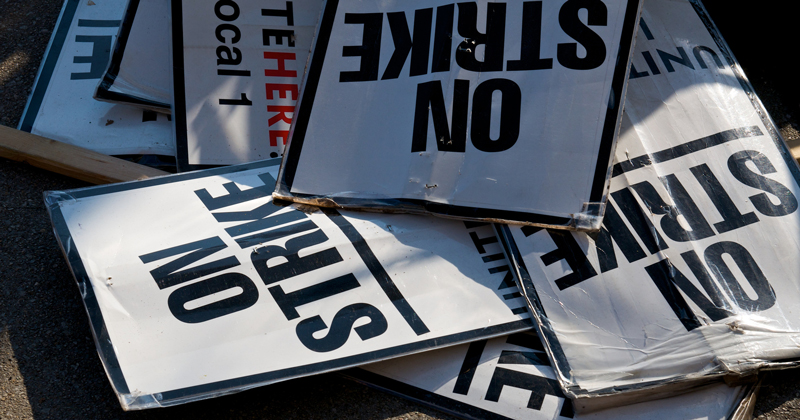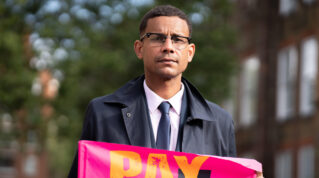School leaders have vowed not to enact the government’s controversial “minimum service levels” during strike action.
The Department for Education this week announced it would legislate to create a power for schools, trusts and councils to order staff back to work so they can remain open for certain groups of pupils.
But it will be “at the discretion of individual employers whether or not to issue work notices” to deliver minimum service levels, and the government’s consultation makes no reference to any form of enforcement of the policy.
DfE refuses to say if it would enforce MSLs
The DfE said headteachers and principals were “best placed to understand the needs of their staff, children and young people”. However, officials repeatedly refused to say this week whether schools would face any action if they did not uphold minimum service levels.
Andrew O’Neill, headteacher at All Saints Catholic College in west London, told Schools Week he would not issue work notices if the legislation passes.
“The government seems to want to have it both ways. They want all pupils in education when it suits them, but if there’s a national day of holiday, it’s absolutely fine. That doesn’t matter.”
He pointed out “most secondary schools stay open to some degree anyway” during strike action, particularly for year 11 and 13 pupils.
During the first national strike day in February, nine in ten schools were open to some or all pupils. However just under half of these were restricting attendance in some form.
Ministers ‘abdicate responsibility’ to heads for strikes
O’Neill warned the proposals put heads in a difficult position.
“It’s a classic thing of government of saying, this is the legislation, and then abdicating the true operational responsibility for it and putting that on to school leaders, who will potentially take the fall and come under that day-to-day slack and criticism.”
The government has put forward two proposals.

One would see minimum service levels prioritise vulnerable children, those with upcoming exams or SATs and the children of critical workers.
The second would prioritise those same pupils at secondary and all pupils at primary.
But Sarah Shirras, executive headteacher of St William’s Primary School and Brundall Primary School in Norfolk, warned the second proposal “would basically mean no right to strike in primary schools”.
‘No right to strike in primaries’
“I’m not choosing which staff can strike and who can’t. I’m also not willing to ask other union members to cover for striking colleagues.
“I repeatedly wrote on the consultation that my preference would be well funded schools and respect for staff pay – and negotiations if a dispute was emerging.”
Robin Bevan, headteacher of Southend High School for Boys and a former president of the National Education Union, added he had “no intention” of issuing any work notices “and, indeed, if directed, I would refuse”.
“This is not a matter of managerial convenience in averting temporary disruptions, but an issue in which deeper values and longer-term principled considerations apply.”
He said the anti-strike measures were the “perverse priority of a government that has, otherwise, abandoned the school system to devastating decline: crumbling buildings, budgetary nightmares and workforce woes”.
Daniel Kebede, general secretary of the National Education Union, said they would “seek assurances from employers that they will continue to rely on constructive negotiations in seeking to resolve disputes, notwithstanding any minimum service levels put in place by the government”.
“We hope that employers will confirm that they do not intend to implement this misconceived legislation by issuing work notices to members of staff.”
How do other countries compare?
The government claims its minimum service levels will bring England in line with other European nations, like France, Spain and Italy.
But other countries’ approaches differ, according to Full Fact analysis.
In Spain, for example, the minimum service levels must be “proportionate” and balance the needs of the community with the fundamental right to strike.
But in 2012, it was reported that four in five Spanish teachers went on strike – suggesting the country does not enforce the rules.
In France, primary schools have to stay open for childcare purposes – but the onus is on local authorities to staff them.
While in Italy, minimum service levels must be set by mutual agreement with unions or by an independent third party.
‘Sham’ consultation republished
The DfE was also forced this week to withdraw its initial consultation on the measures just over five hours after it was first published. Schools Week had revealed a litany of issues, including tiny character limits and a requirement that participants pick a preferred proposal.
The consultation was republished yesterday evening. The department said submissions to the original consultation would still be considered, and that it had extended character limits and added a “no preference” response option for some questions.
But Leora Cruddas, chief executive of the Confederation of School Trusts, said it was “essential” the DfE “now go back to every respondent and offer them the opportunity to withdraw and resubmit” their response.
The government’s consultation proposes that minimum service levels would apply to all state-funded schools, including special schools. Because all pupils in special schools receive some level of SEND support, they would likely need to fully open during strikes under the proposal.
Simon Knight, joint headteacher of Frank Wise special school in Oxfordshire, said it was “unacceptable to prioritise all of our pupils and then place school leaders in the position of deciding who remains in school and which of their staff gets to enact the right to take strike action”.
“This is extraordinarily divisive for both the workforce and wider school communities.”
Potential for strike ‘inequality’ across the country
He warned the “biggest challenge that the specialist sector faces to delivering the minimum service levels, levels often established in law through the EHCP, is the unwillingness of the government to fund us appropriately to do the job that society requires of us”.
Dan Morrow, chief executive of the Dartmoor Multi-Academy Trust, said he would “need to see what comes back” from the consultation, but said he would “balk at doing anything that took away from individuals’ employment rights”.
He also warned there was “no clarity” around enforcement, and though he said it should not be mandatory for schools, not enforcing it “leads to a potential inequity of how colleagues will be treated across the system”.
David Boyle, chief executive of the Dunraven Educational Trust in south London, said ministers were seeking to “sidestep” the issue of school funding “by somehow presenting it as a problem for leaders in schools”.
He said the approach to minimum service levels “feels a bit like” the government’s proposals to send migrants arriving in the UK to Rwanda.
“They’ve got nothing left. So they’re going to double down on something that is unlikely ever to see the light of day on the basis that there will be a change of government at the point where there is an election.”








Your thoughts